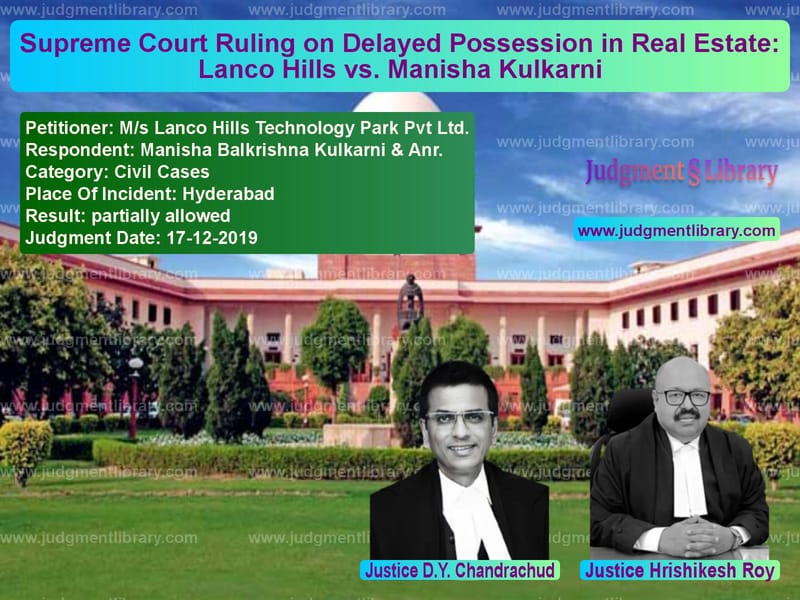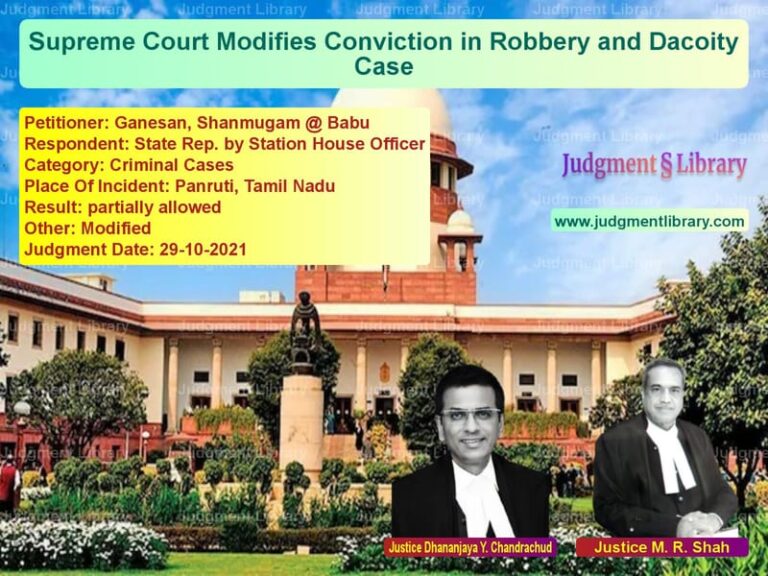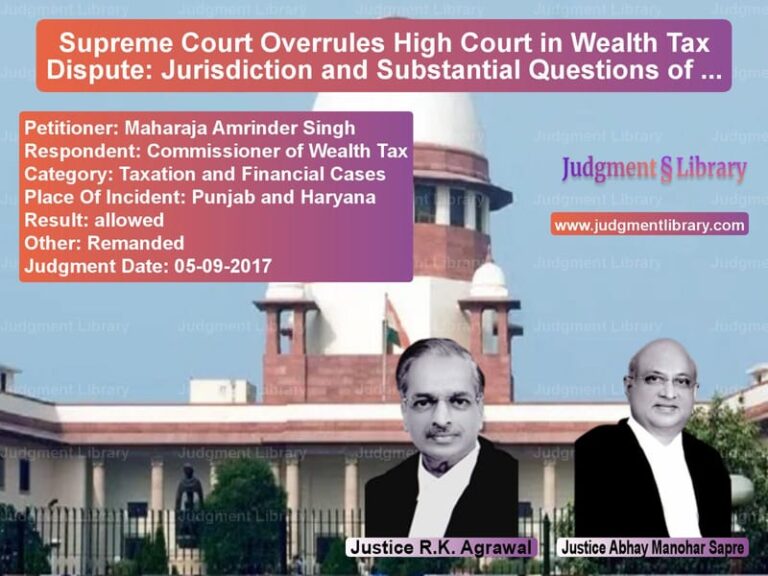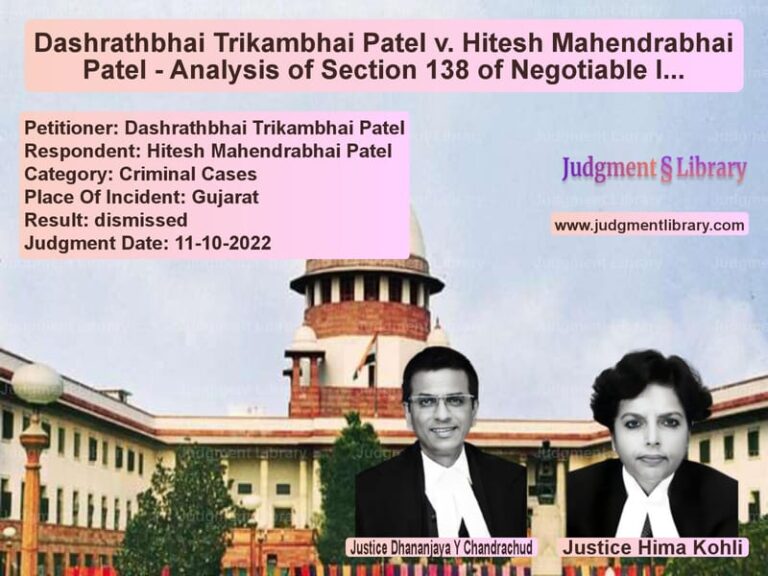Supreme Court Ruling on Delayed Possession in Real Estate: Lanco Hills vs. Manisha Kulkarni
The Supreme Court, in M/s Lanco Hills Technology Park Pvt Ltd. vs. Manisha Balkrishna Kulkarni & Anr., delivered a critical judgment addressing compensation claims for delayed possession of an apartment in Hyderabad. The case clarifies the applicability of contractual compensation clauses, force majeure conditions, and the extent of liability in real estate transactions.
Background of the Case
The dispute arose from an agreement to sell dated 21 March 2011, wherein the respondents (buyers) agreed to purchase an apartment from the appellant (Lanco Hills) for Rs. 1,55,50,826. An additional Rs. 6,00,000 was paid for extra parking space. As per Clause 5.1(iii) of the agreement, possession was to be handed over by 28 March 2011, with a three-month grace period. However, possession was delayed due to legal proceedings initiated by the Waqf Tribunal concerning a portion of the project land.
Possession was finally offered on 3 November 2012, and the sale deed was executed on 11 February 2013. The respondents, dissatisfied with the delay, filed a consumer complaint with the National Consumer Disputes Redressal Commission (NCDRC), seeking physical possession and compensation.
Legal Issues Before the Supreme Court
- Whether the force majeure clause in the agreement justified the delay in possession.
- Whether compensation beyond contractual provisions was justified.
- Whether the buyers were entitled to interest at 18% per annum for the delay.
- Whether the execution of the sale deed in 2013 absolved the developer of further liability.
- Whether the NCDRC erred in enhancing compensation beyond the contractual limit.
Arguments by the Appellant (Lanco Hills)
- The delay was due to a force majeure event—an injunction by the Waqf Tribunal—which was beyond the developer’s control.
- As per Clause 5.1(iii) of the agreement, the developer was liable to pay Rs. 5 per sq. ft. for delays up to six months, but no additional liability beyond that.
- The sale deed executed on 11 February 2013 confirmed that possession had been handed over, thereby discharging the developer from further liability.
- The NCDRC order awarding 18% interest per annum was excessive and against the contract terms.
- The delay was not deliberate but caused by unavoidable legal complications.
Arguments by the Respondent (Manisha Kulkarni & Anr.)
- Possession was not effectively given on 11 February 2013, as multiple deficiencies remained in the apartment.
- Even after full payment, actual possession was taken only on 28 August 2014, as evidenced by the key handover document.
- The developer was liable for additional compensation beyond the contractual limit due to prolonged delay.
- The buyers suffered financial losses due to the delay, including additional rent payments and inconvenience.
- The force majeure claim was not valid as the Waqf Tribunal ruling did not affect the buyers’ specific apartment.
Supreme Court’s Judgment
The Supreme Court partially allowed the appeal, modifying the compensation awarded by NCDRC.
The Court ruled:
“While the contract allows a force majeure extension, the delay in actual handover justifies further compensation beyond the stipulated Rs. 5 per sq. ft. However, the rate of 18% per annum interest awarded by NCDRC is excessive.”
The Court further held:
“A reasonable lump sum of Rs. 10 lakhs shall be awarded to cover the extended delay from 9 February 2013 to 28 August 2014.”
The Court rejected the appellant’s claim that the execution of the sale deed absolved it from further liability. It also emphasized that consumers should not bear the burden of legal disputes between developers and third parties.
Key Takeaways from the Judgment
- Force majeure clauses can extend possession timelines but do not absolve the developer of all liability.
- Courts can award compensation beyond contractually agreed limits if justified by circumstances.
- Excessive interest rates, such as 18% per annum, can be reduced to reasonable lump sum compensation.
- Legal disputes affecting project land cannot be used as an excuse to delay possession indefinitely.
- Consumer protection laws ensure that homebuyers receive fair compensation for delays.
Final Decision
- The developer must pay Rs. 5 per sq. ft. for the six-month delay (as per the agreement).
- An additional lump sum of Rs. 10 lakhs must be paid for further delay until actual possession.
- The compensation must be paid within one month of receiving the judgment copy.
- The NCDRC order granting 18% per annum interest was set aside.
Implications of the Judgment
This ruling reinforces consumer protection in real estate while ensuring developers are not unduly burdened. It balances contractual commitments with judicial discretion in awarding fair compensation for prolonged delays. The judgment clarifies that force majeure claims must be specific and substantiated, not a blanket excuse for project delays.
Additionally, the ruling sends a message to developers that timely delivery is essential and that legal battles over project land cannot be used as an indefinite shield against compensation claims.
Petitioner Name: M/s Lanco Hills Technology Park Pvt Ltd..Respondent Name: Manisha Balkrishna Kulkarni & Anr..Judgment By: Justice D.Y. Chandrachud, Justice Hrishikesh Roy.Place Of Incident: Hyderabad.Judgment Date: 17-12-2019.
Don’t miss out on the full details! Download the complete judgment in PDF format below and gain valuable insights instantly!
Download Judgment: Ms Lanco Hills Tech vs Manisha Balkrishna K Supreme Court of India Judgment Dated 17-12-2019.pdf
Direct Downlaod Judgment: Direct downlaod this Judgment
See all petitions in Contract Disputes
See all petitions in Property Disputes
See all petitions in Damages and Compensation
See all petitions in Judgment by Dhananjaya Y Chandrachud
See all petitions in Judgment by Hrishikesh Roy
See all petitions in partially allowed
See all petitions in supreme court of India judgments December 2019
See all petitions in 2019 judgments
See all posts in Civil Cases Category
See all allowed petitions in Civil Cases Category
See all Dismissed petitions in Civil Cases Category
See all partially allowed petitions in Civil Cases Category







